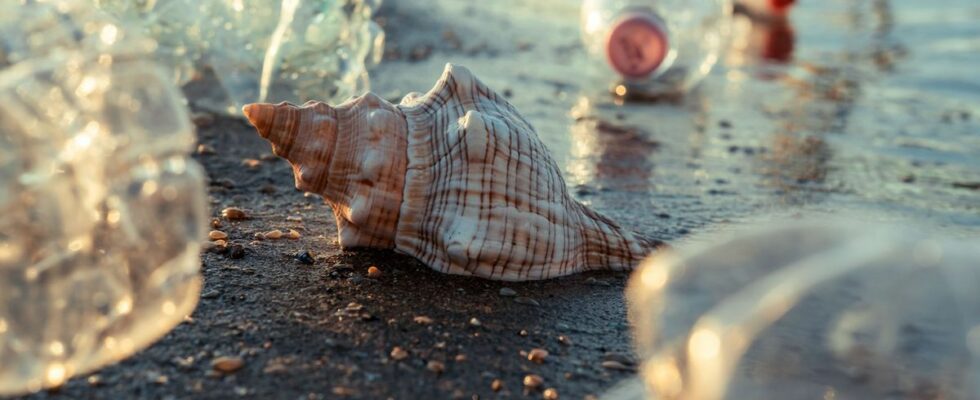Published on
updated on
Reading 3 min.
Waste in your living room? More and more associations or local artisans are starting to design decorative objects or pieces of designer furniture by “upcycling” plastic waste, in the hope of removing a drop of plastic from the ocean. .
“Plastics“in Bordeaux,”Resak“in the Basque Country,”Rehab” in Concarneau: on the French Atlantic coast, a myriad of associations are working to recover and transform plastic waste.
Work in accordance with your beliefs
An activity that is all the more urgent as France is behind: it only recycles 26% of its plastics, including 24.5% of plastic packaging. However, the objective set by the European Green Deal is to achieve 55% recycling of plastic packaging in 2030.
In Concarneau, “we collect old firefighter bags“, explains Nicolas Voisard, who founded Rehab in 2019. This former material sciences student worked for two years in design in Paris, then the young surfer, in love with the ocean, wanted “do something closer to your values“.
For the tools – grinders, extruders – he was inspired by models and plans published freely by the “Precious Plastic” community, launched in 2013 by a Dutch designer.
From waste, Rehab produces design panels “inspired by stained ceramics with a terrazzo effect”. Interior designers use them for kitchen splashbacks.
“Our products are 100% recyclable“, specifies the young man, supported by the Fondation de la mer.
“Convince”
All these associations want “show that it is possible to transform waste into beautiful and designer objects“, underlines the Breton entrepreneur Didier Tabary, founder of the Kresk group (cosmetic laboratories SVR, Lazartigue, etc.), who took charge of the online marketing of the objects thus produced.
In 2023, the 33 associations supported by the Fondation de la Mer in France and Africa have “recovered a total of 630 tonnes of plastic, including 600 tonnes coming from Africa“, specifies Muriel Barrou, head of the “ocean protection” division at the Foundation.
Or a tiny drop in the gigantic ocean of global plastic: the production of plastics on the planet has increased 230 times compared to the 1950s, while the world population has tripled in the same time, she admits, nevertheless convinced that its painstaking work must continue.
“We focus on plastics for which there is no industrial recycling solution“, says Lila Costes, founder of the Resak association in Anglet in the Basque Country, the waste that never arrives in the yellow bins, often sent to landfill, and the production losses of local manufacturers.
It has agreements with a subsidiary of the Vinci group specializing in signage to recycle white polyethylene shims used on cable rolls.
With two employees and four volunteers, the association recycled 3 tonnes of waste in 2023 and plans to reach 10 tonnes.within three or four years“.
Above all, it raised awareness among more than a thousand people. “Ultimately, our goal is to convince people to stop using plastic.“, explains Lila Costes.
“Refuse to buy”
Manufacturers in partnership with Resak must also commit to reducing their own consumption. The association stopped its collaboration with a Suez subsidiary responsible for water quality analysis, which uses one plastic bottle per beach per day, because the latter did not seek to reduce the number of bottles. And the sea water damaged their machines.
The young engineer knows what she is talking about after seven years as an employee designing packaging for an international food industry giant from which she resigned in 2022.
“It drove me crazy to hear the talk about reducing the thickness of yogurt pots from manufacturers when in reality, we are always selling more of them.“.
For her association, she opted for a “targeted local approach” which does not cause waste to travel: in Anglet, she works with a manufacturer of cellular polystyrene surfboards.
With the scraps, she makes recyclable coffee tables, stools or lamp bases, with marine names like “Ecume” or “Lagon”.
